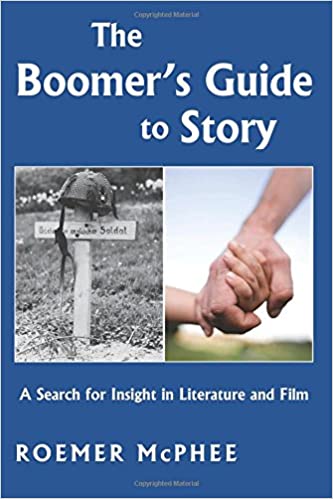
Written by Tim Gebhart
Full disclosure first. I tend to watch a film almost solely for enjoyment. I don’t usually concern myself with a movie’s structure or ponder how many metaphorical elements it may have. In fact, I remain befuddled by the high regard for Citizen Kane. I am, though, a Baby Boomer, falling about in the center of the commonly used 1946-1964 birth range used to define the boomers. Fortunately, the first isn’t a disqualification and the second is of value when it comes to reading The Boomer’s Guide to Story: A Search of Insight in Literature and Film.
Although the title refers to literature and the book mentions a handful of songs, movies are Roemer McPhee’s main focus. Almost all the literature he discusses in the roughly 300 entries gave rise to movies and he writes of the original work and the film together. In looking at the cinema that influenced Boomer culture and that it produced, McPhee isn’t trying to place the works into particular schools of thought. Rather, the book looks to the themes in “a search for insight” into the ideas that influenced the Boomer generation and it would express.
The Boomer’s Guide to Story is designed so it can be read straight through (as I did) or dipped into based on interest in or a planned or recent viewing of a particular title. For each entry, there are one or more subheads laying out in a few words the ideas Roemer believes the work contains or epitomizes. Each is followed by an essay of a couple paragraphs summarizing the work as a whole or as it relates to the particular idea and briefly discussing the idea. For the most part, the essays meet Roemer’s assertion that they are objective.
A significant number of the entries discuss only one or two ideas and run from half a page to a page in length. If that is an accurate measure, it isn’t hard to determine the movies Roemer deems most significant. The entry for The Deer Hunter runs 14 pages and lists 23 ideas or insights. By my count, the next longest include Chariots of Fire and the first two installments of The Godfather at about four and a half pages each.
The handful of songs that appears in the book seems somewhat odd bedfellows. They include Meat Loaf’s “Bat Out of Hell” (explicating heroism), Bread’s “Everything I Own” (a tribute to filial love) and Bruce Springsteen’s “Mansion on the Hill” (about socio-economic division). It is unlikely the albums from which they come will appear in a triad on anyone’s CD shelves.
A person diving into the book at random or picking selected titles out of the table of contents may not notice some of these things. The more casual approach may actually make a few problems with the book less noticeable, although some of them are inherent in the number and breadth of the works included. As a page or idea count would suggest, the treatments can be uneven. Because it’s one of my favorite movies, I don’t have a problem with the space devoted to The Deer Hunter. But someone who isn’t a fan might well view one of their favorite films as a better expression of the Apollonian and Dionysian traits in humans. While the essays may seek objectivity, simply the selection process for any book of this type involves some subjectivity.
This also means that, in some instances, the summary of the story exceeds discussion of the particular idea. Thus, in the one paragraph entry on the BBC television mini-series Cambridge Spies, there is more about Kim Philby’s life than its insight on illusions. Less frequently, an essay may talk around the core idea rather than develop it. One distraction limits itself to longer entries. Evidently believing readers might not read all the subparts of an entry at one time, Roemer follows a character’s name with a parenthetical reference to the individual who played them. Thus, in the 14 pages about The Deer Hunter we read 11 times that Robert De Niro plays Mike Vronsky (and six references to the sequence where American POWs are forced to play Russian roulette as a “long scene”).
Granted, we don’t know Roemer’s “qualifications” to write the book. We presume but are not told that he is part of and, hence, has the perspective of the Boomer Generation. Likewise, we don’t know if his background is in film, literature, or philosophy. Perhaps, then, this is a book any one of us could write. Yet Roemer deserves credit for not only pointing out a wide range of ideas but also relying on insight, not just the obvious (such as the fact “Everything I Own” is about the songwriter’s parents.) He suggests that a core idea in Dead Poets Society actually comes from a philosophical error. Likewise, No Country for Old Men may be more about the immutability of people and violence than chance and unpredictability.
It is impossible to write definitively on the ideas and insight of any generation. The Boomer’s Guide to Story, though, should provide numerous starting points for pondering or debating what vital ideas shaped the Baby Boomers and vice versa.